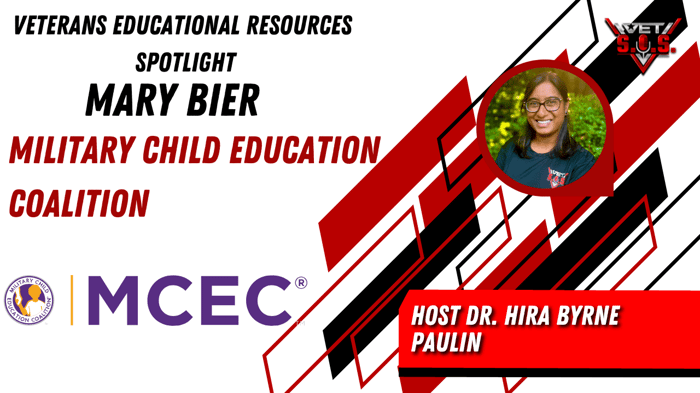Military Child Education: Supporting Students Through Transition and Change
Military-connected children grow up in an environment that is anything but predictable. With frequent moves, new schools, and the constant reality of having a parent deployed, these young students often experience challenges that go beyond the classroom. In fact, research shows that military children move six to nine times before high school graduation—a statistic that highlights just how disruptive military life can be to their educational experience. In a recent episode of the VET S.O.S. Veteran Educational Resources Spotlight, host Dr. Hira spoke with Mary Bier, MBA, President & CEO of the Military Child Education Coalition (MCEC), about how schools, communities, and parents can better support these students. The conversation highlighted the organization’s mission, innovative programs, and the critical role of education in shaping resilient, successful young adults.
Why Military Child Education Matters
 Mary Bier
Mary BierAt the heart of the discussion is a simple but important truth: children of service members deserve the same opportunities for academic and social success as any other child, despite the instability of military life. Frequent school changes can disrupt not only academic progress but also friendships, extracurricular activities, and mental health.
Military child education addresses these unique needs by providing resources, mentorship, and tailored programs that help students adapt quickly, stay engaged, and feel supported no matter where military service takes their families.
As a military spouse and parent herself, Mary Bier knows these challenges firsthand. Having moved five times with her children—including overseas assignments—she has seen both supportive school environments and those without the resources to meet military children’s needs. These personal experiences fuel her passion for advocating for programs that reduce the stress of transitions and help children thrive.
The Mission of the Military Child Education Coalition
The Military Child Education Coalition (MCEC) has been serving families for over 25 years. Its mission is to educate, advocate, and collaborate to ensure that all military-connected children receive the support they need.
What makes MCEC unique is its commitment to research and validation. The organization works with a Science Advisory Board of experts in psychology, psychiatry, public policy, and research to ensure its initiatives are effective and responsive to today’s military families. This evidence-based approach ensures that every program offered is not only well-intentioned but also proven to work.
Programs That Strengthen Military Child Education
Mary Bier highlighted several of MCEC’s signature programs, each designed to address specific challenges in military child education.
1. Student 2 Student (S2S)
The Student 2 Student (S2S) program is a peer-to-peer mentoring initiative for elementary through high school students. Its purpose is to create a welcoming environment where new students—especially those from military families—can quickly integrate academically and socially.
Mary explained how her own children benefited from this program. When her family moved during a deployment, the school’s S2S chapter helped her kids find friends, build confidence, and settle into their new environment. Without such support, the stress of constant moves could easily become overwhelming.
S2S demonstrates how peer connection is a vital element of military child education, creating a sense of belonging that helps students focus on learning instead of loneliness.
2. Francis Hesselbein Student Leadership Program
For high school students active in S2S, the Francis Hesselbein Student Leadership Program provides a transformative, week-long leadership experience at West Point or the U.S. Air Force Academy.
Students engage in civic leadership, team building, and community involvement activities designed to build confidence and prepare them for the future. By strengthening leadership skills, this program equips students to bring those lessons back to their schools and grow their local S2S chapters.
This program exemplifies how education extends beyond academics to develop well-rounded leaders prepared for college, careers, and life.
3. Caregiving Youth Leadership Program
Not all military-connected students experience the same challenges. Some take on caregiving roles at home, supporting a parent or family member dealing with visible or invisible injuries. Recognizing this unique group, MCEC launched the Caregiving Youth Leadership Program in 2023.
This program provides resilience-building, leadership training, and community support specifically for caregiving youth. Held twice a year in San Antonio, Texas, it ensures that these students are not overlooked in the broader conversation about military child education.
Supporting Educators in Military Child Education
While programs like S2S and leadership initiatives directly support students, educators play a critical role as well. Many teachers near military installations are familiar with the needs of military children, but others—particularly in remote duty stations—may have little experience working with them.
To bridge this gap, MCEC provides professional development programs for teachers, counselors, and school administrators. Through webinars, on-demand resources, and Global Training Summits (GTS), educators learn how to:
Recognize the unique challenges of military-connected students.
Ask the right questions when welcoming a new child.
Provide effective interventions to support academic and emotional well-being.
By equipping educators with the right tools, MCEC ensures that military child education is prioritized in every school, not just those near bases.
Opportunities for Military Children and Families
Mary also highlighted several upcoming opportunities:
Francis Hesselbein Student Leadership Program (Fall Cohort): Applications are open for the October session at West Point, with a deadline of September 15. The program is free for accepted students, thanks to donor support.
Global Training Summits: Scheduled for September 22 in Atlanta and September 26 in Austin, these events are premier professional development opportunities for both educators and student leaders.
Heroic Hearts Scholarship: In partnership with Columbia Southern University, this scholarship offers full tuition, technology, and fees for four years to a military-connected high school senior. Applications open in September and close in February, with priority given to caregiving youth.
These opportunities represent the forward-looking vision of military child education, ensuring not just short-term stability but long-term academic and career success.
The Role of Communities in Military Child Education
While structured programs and educator training are crucial, Mary emphasized that communities themselves play a vital role. Sometimes the most meaningful support comes from small gestures—a warm welcome, a friendly introduction, or a simple hello to a new family moving in.
These small acts of kindness create the foundation for stronger school and community relationships. As Mary explained, “Lean in, say hello, make that first connection. Those small steps can be so meaningful.”
Military child education isn’t only the responsibility of teachers and nonprofits. It is a shared effort that includes neighbors, classmates, and community members willing to support families navigating the constant demands of military life.
Why Military Child Education Must Be a Priority
With approximately 60% of military-connected children under the age of 13, early intervention and consistent support are critical. The stability and resilience built through strong military child education programs prepare these students for future success in high school, college, and beyond.
When schools, communities, and organizations like MCEC work together, military children are not defined by disruption or instability. Instead, they are empowered to thrive academically, socially, and emotionally.
Conclusion
The conversation between Dr. Hira and Mary Bier highlights the urgent importance of education for our military children. From peer-to-peer mentoring to leadership training and scholarships, the Military Child Education Coalition is ensuring that military-connected students have the resources and support they need to succeed.
Military life will always involve challenges, but with the right support systems in place, children can turn these challenges into strengths. By investing in their education, we invest in the future of resilient, adaptable, and capable young leaders.





